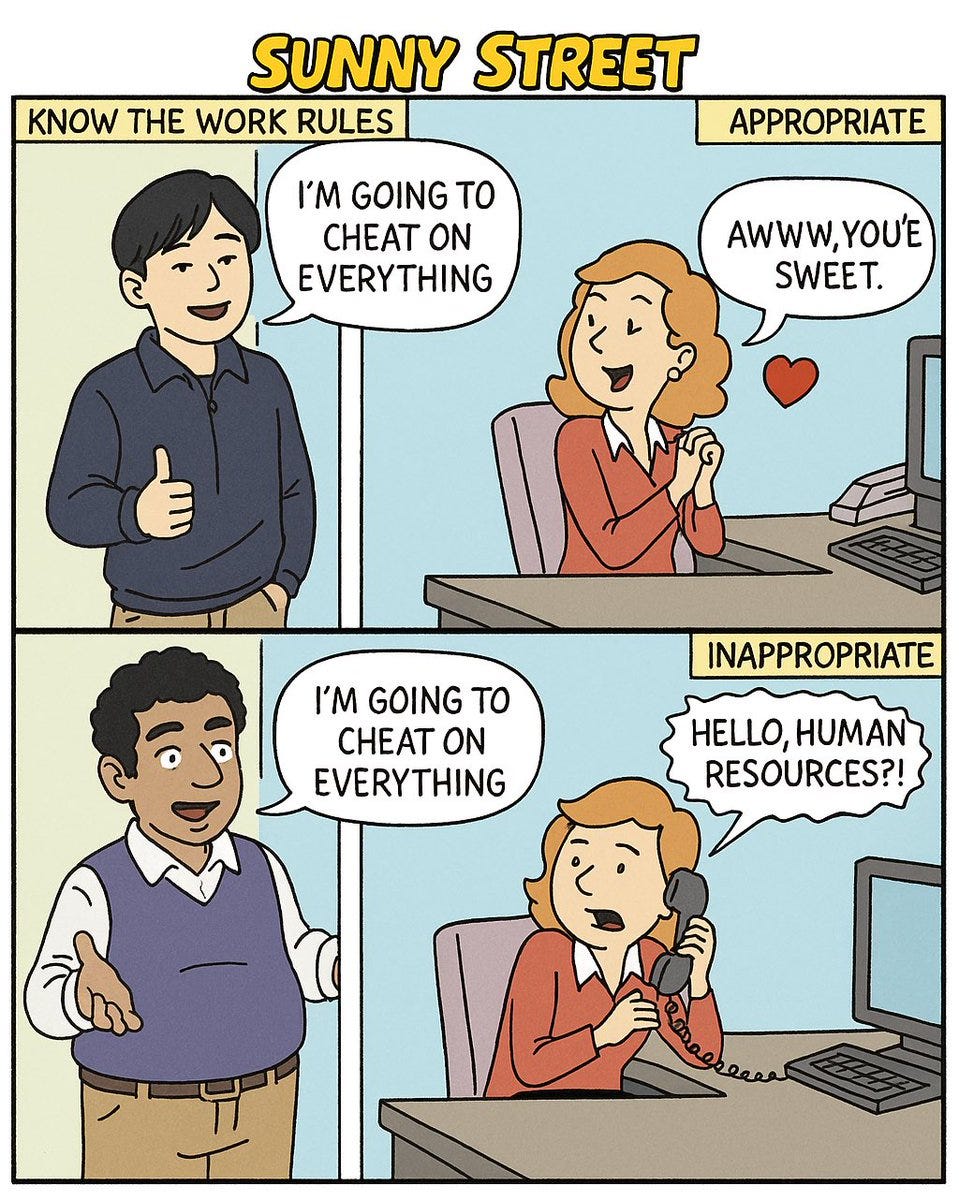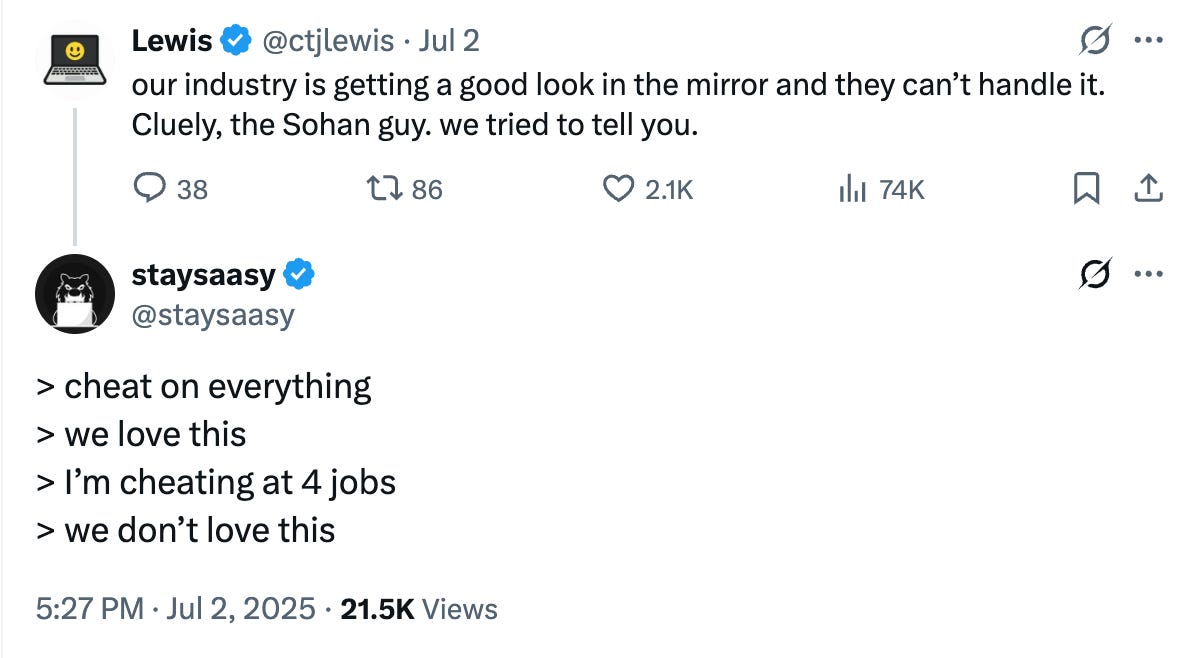Last week, the name Soham Parekh trended for all the wrong reasons. The 25-year-old software engineer from Mumbai was exposed by founder Suhail Doshi for holding multiple full-time roles at early-stage startups, a remote-era hustle that reportedly netted him over $1M a year and left a trail of frustrated founders in his wake.
The jokes came fast. Companies marked themselves safe. Founders posted inbox receipts. One meme showed Soham hoarding jobs from hungry NYU CS grads. The consensus? A cautionary tale for remote work. Soham had gamed the system and, in doing so, violated something sacred: startup trust.
But Soham didn’t hack his way in, he interviewed. He passed technical screens. He got offers. He onboarded. The system wasn’t tricked. It worked exactly as designed.
As
put it: “Fraudsters like this expose the hollow scaffolding which we think is solid. They do what stress tests should’ve. He’s pretty much the SQL injection of startup recruiting.”The real scandal isn’t that someone figured out how to juggle jobs, it’s that the system made it seem like a smart bet, and none of the safeguards in place stopped him. We’re not mad he broke the rules, rather we’re mad he exposed how flimsy they are.
The loyalty paradox
While Soham was getting dragged, 22-year-old Roy Lee was being celebrated. His startup, Cluely, raised $15 million from Andreessen Horowitz to build “a world where you never have to think again.” The product? An AI tool that feeds answers in real time during meetings and interviews, or in its own words: “cheat on everything.”
Roy had been suspended from Columbia after releasing an earlier version that helped users fake technical interviews. That suspension now serves as founder lore.
The symmetry is hard to ignore. The same week Soham went viral, Cluely had even interviewed him for a job.
Soham grifted multiple jobs for personal gain; Roy built a company that enables similar deception, but in a way that can scale, raise funding, and deliver returns. One is seen as a drain. The other, a growth opportunity. Soham’s hustle was private and inefficient. Roy’s is productized.

The devotion trap
Sure, an employee working multiple jobs is a liability—for IP, security, even output. But reading through replies, one gets the sense that the outrage over Soham was less about lost productivity and more about breached emotional protocol. As Shopify’s Carl Rivera explained, today’s tech jobs demand more than deliverables.
This is the unspoken agreement of startup work. Companies don’t just want your skills; they want your belief, your passion, your willingness to sleep in tents.[*] To treat the company like your own, even when it’s not. Equity sweetens the deal, but the real incentive is existential. You’re not just here to work, you’re here to care. And in return, you’ll be rewarded with something more: personal belonging.
Soham withheld that performance. He spread it across companies, rotating through onboarding documents and standups like a consultant. The betrayal felt personal because startup culture has made work personal. He treated it like a second job.
And while Soham was being vilified for divided loyalty, Meta was dangling $100 million signing bonuses to poach OpenAI researchers—some “exploding” within hours. It was a coordinated talent raid, aimed at gutting the lab from the inside. These were people who’d signed on to “benefit all of humanity.” Meta answered with math. In a market obsessed with scale, loyalty flows to whoever can pay for it.
The performance economy
The Soham saga and Cluely’s rise aren’t outliers, rather, they serve as case studies in how the ecosystem actually works. We’ve built an industry that rewards optimization over ethics, virality over value, and performance over product. Hustle is treated as a stand-in for integrity, until someone plays the game too efficiently.
Even the backlash gave away the game. Y Combinator’s Garry Tan praised the community for “catching” Soham, but multiple YC-backed startups had hired him. He wasn’t freeloading off the system; he was farming it. He targeted the valley of move-fast founders, where technical skill is verified quickly and commitment is assumed blindly.
For all the talk of meritocracy, much of startup recruiting runs on speed and gut feeling. Soham didn’t subvert those norms. He followed them to their logical endpoint.
The Clone Wars
Not long after Cluely’s launch came the copycats. First was Cheating Daddy, an open-source replica with similar whisper-tech. Then: Glass, a Y Combinator-backed project accused of copying Cheating Daddy’s code without proper attribution. As
summarized it: a YC startup built a cheating tool in four days by stealing code from an open-source clone of another cheating tool, which had already raised $15M. Hm!Spectacle as a service
Cluely’s real product might be attention. With a 50-person “intern army” each boasting 100k+ followers, Roy has built a company that seems designed to primarily to generate content about itself. The demos are slick, the controversy, cultivated. After a party Cluely hosted got shut down by police, Roy spun it as “the most legendary party that never happened.”
As
observes, we’re seeing the rise of “meta-startups,” companies whose sole purpose is to play the game: “They have no vision beyond attention and scale. They have no sense of impact or betterment. All romanticism is gone.”In that world, attention is the primary metric of success, with product utility an afterthought. Cluely has mastered “spectacle as a service,” perform innovation well enough and the money follows. Visibility attracts capital. Capital buys runway. Runway becomes market share. The meme is the message.
The exhaustion chorus
But people are tired. They’re tired of AI slop, of founders who are more influencer than builder, and of an ecosystem that rewards volume over value. “Just build good products,” pleaded one. Another called the space “soul-sucking” and someone compared it to “reality TV.”
We ask for loyalty and offer none. We celebrate disruption then vilify those who disrupt systems we benefit from. We reward the loudest voice in the room while claiming to value depth. Every time we mistake intensity for intelligence or treat virality as validation, we feed the same cycle we claim to despise.
The return to substance
Still, there’s a white pill. As
put it: use AI “to create more beautiful things.” Reject “faux innovation culture.” The appetite is there. The people yearn for care, for craft, for building with intent. Maybe the most subversive move isn’t to grift smarter, but to pause and ask: What are we building? And why would anyone want to belong to it?The answer isn’t stricter oversight. It’s creating the kind of environments where there’s nothing hollow to optimize against. It’s a collective return to substance over spectacle. Places where speed still matters, but it’s in service of depth, and ambition is measured not just by reach, but by resonance.
Maybe we also need to stop pretending the system rewards anything it claims to. Because the question isn’t whether Soham deserved the work. It’s whether we’ve built a world where his playbook made perfect sense.
—Carly









You've posed a question I ask all the time. What's the point of building faster and faster (What AI loves to promise) if what you're building isn't compelling or even worse an AI wrapper company.
Spot on! Ezra Klein just had a podcast around economy is attention and attention is economy: https://youtu.be/cZO1B4fZlOw